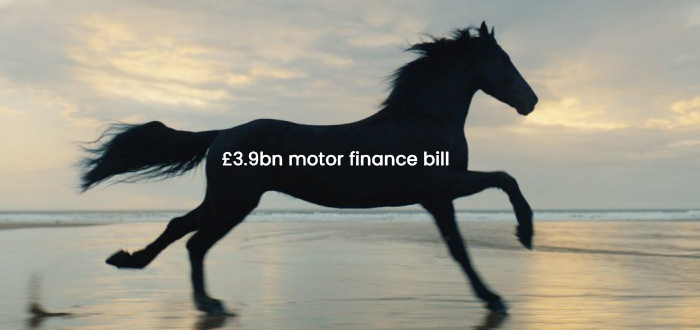Shares in Lloyds Banking Group and Close Brothers slid further on Monday after a landmark London court ruling that could expose motor finance providers to billions of pounds in extra compensation.
On Friday, the Court of Appeal resoundingly sided with consumers and ruled it unlawful for car dealers to get a commission from lenders “without obtaining the customer’s fully informed consent to the payment”.
The test case is set to influence the Financial Conduct Authority’s (FCA) decision on whether to implement a punitive redress scheme as part of its probe into the so-called discretionary commission agreements (DCAs). The agreements allowed brokers to adjust interest rates on car finance without the knowledge of the borrower.
The ruling sent shares in some of the most exposed banks down sharply on Friday and further today as investors digested the decision.
Lloyds’ stock price dropped as much as 2.9 per cent this morning, making the worst performer on the blue-chip FTSE 100 index. It previously closed two per cent down on Friday.
Meanwhile, Close Brothers was the biggest faller on the mid-cap FTSE 250 after plunging as much as 10 per cent. The stock has been in freefall since Friday, when it cratered a record 25 per cent.
Shares in Close Brothers, one of the banks involved in the test case, are currently trading at their lowest level in almost three decades.
Close Brothers is considered the most exposed lender to the FCA’s review in relative terms and said the precedent set by the ruling could result in “significant liabilities”.
The 146-year-old merchant bank has paused selling new car loans in light of the judgment and intends to appeal to the UK’s Supreme Court.
The FCA announced in January that it would review whether customers were unfairly charged high interest rates between 2007 and 2021, when DCAs were banned.
“The judgement handed down on Friday has significantly increased the potential impact of this issue for banks,” Benjamin Toms, an analyst at RBC Capital Markets, told us.
“A broad interpretation of Friday’s ruling means that we now could be talking about any commission in any finance arrangement where the customer has not expressly consented to the broker receiving a defined quantum of kickback.”
Lloyds is considered the most exposed lender in absolute terms as the owner of Black Horse, the UK’s biggest motor finance provider. It made a £450m provision for potential costs in February.
The lender said on Monday that it was “assessing the potential impact” of the ruling, which “sets a higher bar” for disclosure of DCAs than previously thought.
RBC’s worst-case scenario now estimates a £3.9bn bill for Lloyds, including compensation, interest and administration costs.
That number has increased from a previous estimate of £3.5bn. RBC forecasts a potential £387m hit for Close Brothers, up from £350m.
Toms said analysts’ estimates for the potential fallout have generally been “too optimistic” and expected them to now “move their impact assessments closer to our base case”.
RBC’s base case is £2.5bn for Lloyds and £250m for Close Brothers.
Previous analyst estimates for the potential hit to bank profits topped out at around £16bn. However, Citigroup analysts said their previous estimate of a £9bn bill could double if the ruling sets a precedent for the broader UK motor finance industry.
These kinds of costs would make a redress scheme the UK banking sector’s biggest since the infamous PPI scandal – which saw banks hand back more than £38bn between 2011 and 2019 over missold payment protection insurance.
“On top of this, you need to consider that the majority of motor lending in the UK is being performed outside of the banking sector by finance divisions of the motor companies themselves,” Toms said.
Gary Greenwood, an analyst at Shore Capital, said the ruling “could have significant financial implications for lenders in terms of potential redress/remediation costs, but also for customers should lenders decided to pause for breath while they assess the situation”.
Shares in Barclays, which analysts have warned could face an up to £500m bill, dropped as much as 1.9 per cent on Monday morning. The bank performed auto lending between 2010 and late 2019, although its operations were relatively small.
Earlier this month, Barclays kicked off a separate London court challenge over motor finance. The bank is appealing a ruling that it unfairly treated a customer who purchased a used car.

